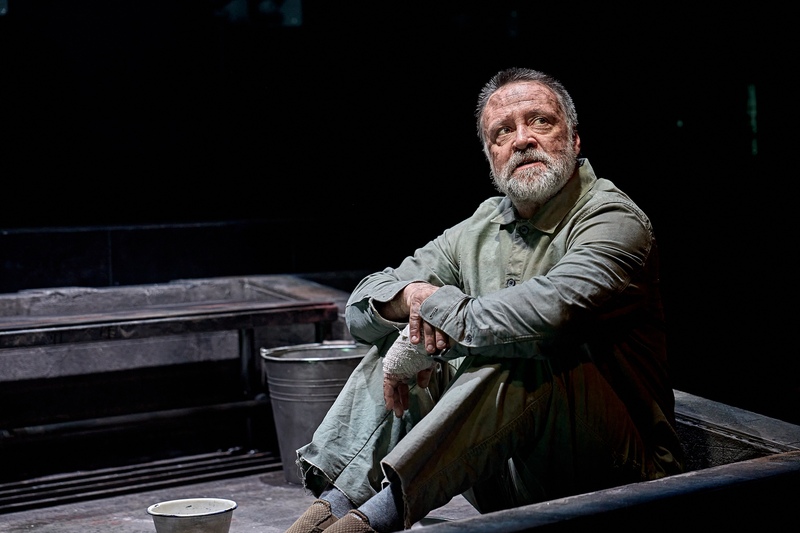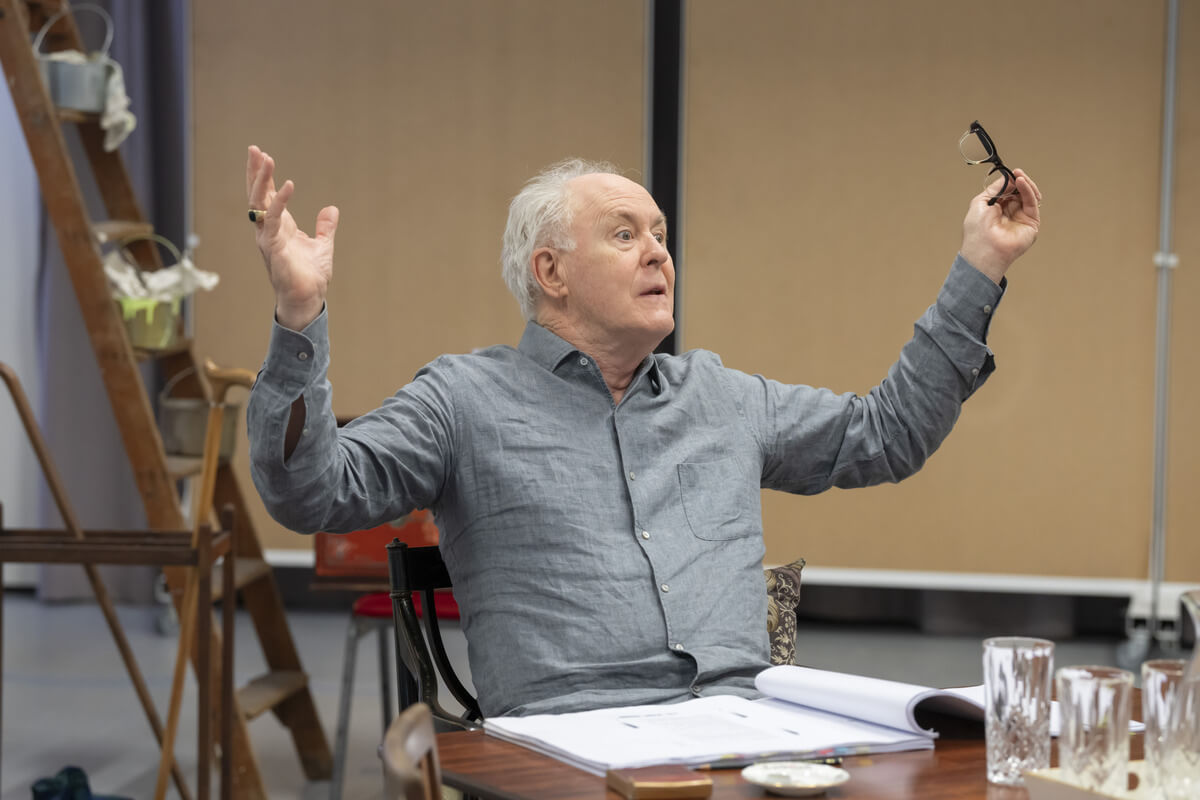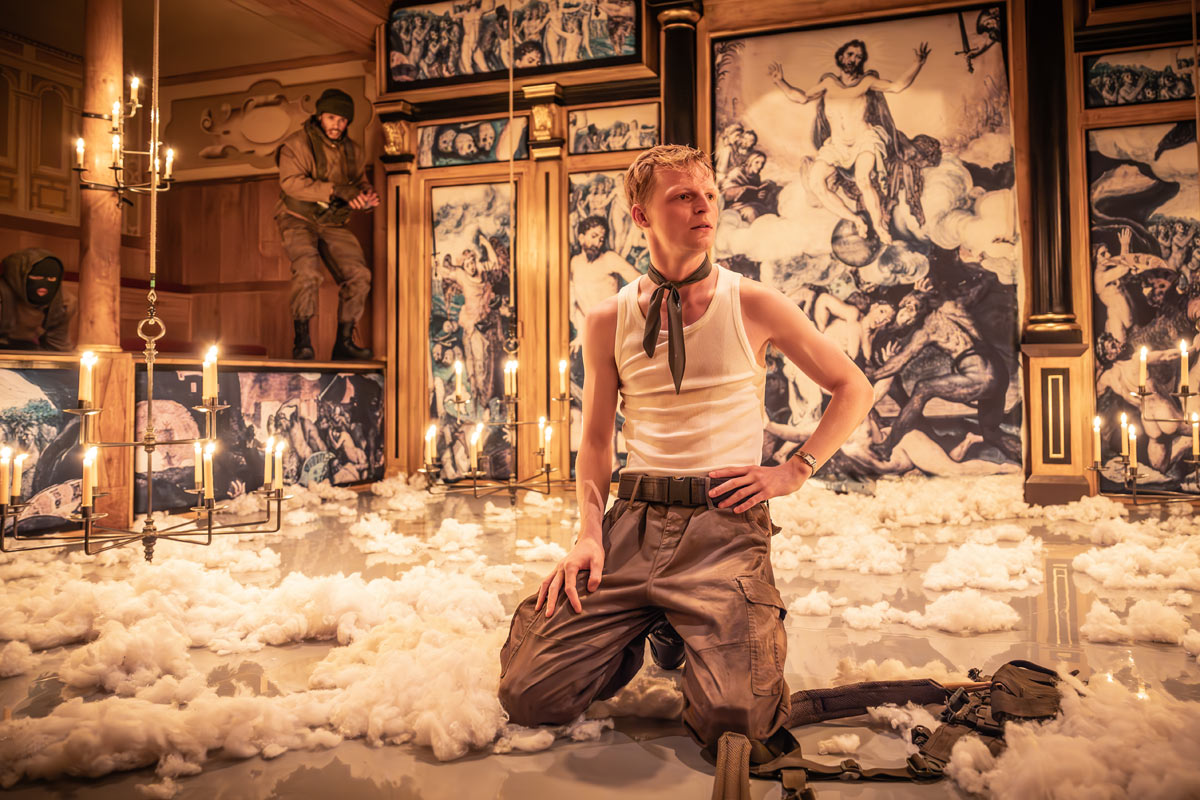The play has a fittingly unrelenting 80-minute run time with no interval, the heart of the action takes place within the two cells in which Mr Valdez (Ali) and Wallace (Harrington) are imprisoned for unknown reasons in an unnamed country currently under a totalitarian regime. Both characters, we are told, previously led very ordinary lives. Mr Valdez was an actor in a theatre company and Wallace a town doctor ‘of sorts’. Each believes they have been locked away for ‘next to nothing’, neither ever fully disclosing their crime or indeed the nature of their sentence. Both mourn their freedom, however, and struggle to cling to the memories of their daily lives before imprisonment, joking that perhaps it would have been more worth it to have actually done something they believe to be against the state.
With a staging reminiscent of Waiting for Godot and of course, other much darker political exposés like Orwell’s 1984, Patarkatsishvili has cleverly conjured a snapshot of the lives of those abandoned, as it were, by society at large. Out of sight and out of mind, they are left at the mercy of their captors and subjected to endless acts of cruelty - death being their only logical escape.
From the onset, our cast appears weary and dejected, passing their time playing games through the dividing wall and testing their memories to prevent the inevitable onset of madness and despair. As each laments their own situation, we gauge a pervasive sense of empathy and pity for their fellow characters, especially when an inmate is taken off stage for their ritual interrogation/ torture session.
Throughout, the inmates flit between states of passivity, fear, paranoia and minor feelings of hope. Each emotion wreaks havoc emotionally and physically. Neither inmate can quite come to terms with the reality of their situation - as Mr Valdez relates hearing from ‘the women in the cell between [he and Wallace] - a being as old as time, who voiceless mutters tales about the nature of the world, how both the prison and the regime have always manifested in one way or another throughout history’. Meanwhile, Wallace seeks to maintain control over his mind, his words and his ability to love - the three things he believes he still has autonomy over. Each has come to depend on the other for company, a sense of reality and of defiance against futility and complete abandonment. Perhaps this is why one of the harshest moments of the play involves the realisation of the shortfalls of their very relationship. As Mr Valdez reminds Wallace, neither have ever actually met and are, despite having communicated for three years, still relative strangers.
Here, the vulnerability of the human state and our seemingly absurd yet persistent instinct to survive even in the most extreme of situations, is deliberately pried open and investigated. The dialogue between Wallace and Mr Valdez leans towards philosophical evaluation of the complexity of the human condition, especially under such intense affliction. Captivity and isolation persist throughout the narrative - ‘all regimes are the regime’ states, Mr Valdez, as he and Wallace question if mankind can ever truly be free, and indeed what freedom even means.
An unexpected dramatic turn comes from Tomlinson as the prison guard, burdened with feelings of empathy for the inmates. It is his duty to enact torturous punishments on the prisoners, from the downright brutal to those designed to ‘chisel…sand the will to nothing’. However, these mental, physical and psychological cruelties he must inflict start to strain. Punished by the powers that be for fraternising with the inmates, he struggles to remove their humanity from his mind and wishes them dead so he may be relieved of his own guilt and commiseration. This is a deep and inventive solution for investigating both sides of such a regime - enriching the play with not only a lament on the mentality of prisoners but also their oppressors.
Indeed, whilst the action does not leave the cells of Wallace and Valdez, we are transported by the depth and evocative potential of Wright’s myriad language. Lightning and sound play a role here too, enlivening the space and skilfully keeping both prisoners (and the audience) on edge.
On the whole, this is a rich adaptation of a textured dramatic piece. Whilst harrowingly stark and ruthless given its subject, it is stimulating and all the more thought-provoking for this. A completely no-bars-held work, it is well worth a viewing over its limited run at Riverside.
At Riverside Studios until 14 December 2024.

 Richard Harrington (Wallace) in The Unseen. Photo by Manuel Harlan
Richard Harrington (Wallace) in The Unseen. Photo by Manuel Harlan


